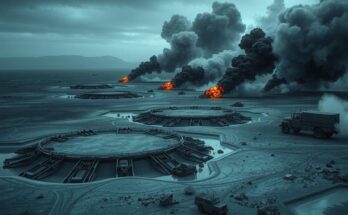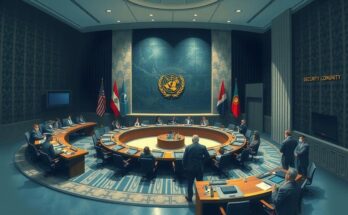The M23 militia, with Rwandan backing, recently captured critical cities in eastern DRC, signaling a shift in regional power dynamics. This resurgence is linked to Rwanda’s security and economic interests. The situation has led to grave humanitarian crises and strained relations with neighboring Burundi and Uganda, while DRC’s President Tshisekedi struggles to maintain authority amidst rising tensions and international pressure.
In late January and early February 2023, the M23 militia seized control of Goma and Bukavu, the eastern Democratic Republic of Congo’s (DRC) pivotal cities. The Rwandan-backed group has since expanded its territory significantly, establishing local governance which indicates its ambition to reshape the geopolitical landscape of Africa’s Great Lakes region.
Originating in 2012, the M23 rebellion was temporarily quelled in 2013 due to international intervention targeting Rwanda. While M23 claims to protect the Rwandophone community, particularly the Tutsis in eastern Congo, its ambitions align closely with Rwandan interests, particularly through the establishment of the political wing, Alliance du Fleuve Congo (AFC). This organization reflects a broader agenda aimed at regime change in Kinshasa.
The resurgence of M23 in November 2021 was prompted by the Congolese government’s failure to honor commitments made to militia veterans and escalating concerns from Rwanda regarding its interests in the region. Rwanda perceives the Democratic Front for the Liberation of Rwanda (FDLR) as a persistent security threat and seeks to mitigate dangers posed by neighboring countries involved in military operations against insurgencies within their borders, which are believed to impact Rwanda’s security.
The economic stakes are significant, as Rwanda relies on gold exports, much of which is sourced from eastern DRC. Moreover, the presence of Rwandan troops in DRC has increased substantially since the militia’s territorial gains, with the UN estimating between 4,000 and 7,000 Rwandan soldiers stationed in the country. The offensive by M23 has resulted in severe humanitarian repercussions, displacing over three million individuals and raising concerns over public health and regional instability.
Burundian leaders are apprehensive about possible conflict with Rwanda, given the rising tensions between the two countries. Each government accuses the other of harboring rebels, and corresponding military and rhetorical escalations have ensued, with Burundi’s president urging readiness for imminent conflict.
In contrast, Uganda has exhibited ambiguous engagement with M23, having reportedly provided support while simultaneously expanding its military presence in DRC. This dual approach signifies Uganda’s strategic interests in the region, focusing on resource control and political influence.
The situation has further complicated President Felix Tshisekedi’s grip on power, as his army’s morale declines and crucial military alliances dissolve. There is growing ethnic and political tension within the DRC, with various groups mobilizing in response to the conflict, reminiscent of the early phases of the Second Congolese War.
International pressure, particularly from the U.S., played a pivotal role in curtailing M23’s previous actions. Tshisekedi has sought to rally international support once again, proposing mineral wealth exchanges in return for military assistance. However, his efforts have met limited success.
Under President Biden’s administration, the U.S. has criticized Rwanda’s involvement and imposed sanctions on key officials. Further actions are needed to compel Kigali to abandon its support of M23, especially against the backdrop of escalating conflict in the region. The urgency for international intervention mounts as the situation deteriorates, with M23 further entrenching itself within eastern DRC.
The ongoing events in the DRC highlight a challenging landscape shaped by the M23 militia’s advances and Rwanda’s growing influence. The humanitarian crisis and the potential for regional war pose significant threats to stability in the Great Lakes region. Effective international pressure, particularly from influential nations like the United States, will be essential to curb Rwanda’s involvement and restore order to the DRC. Urgent action is required to prevent a wider conflict and increase humanitarian support for the affected populations.
Original Source: responsiblestatecraft.org




